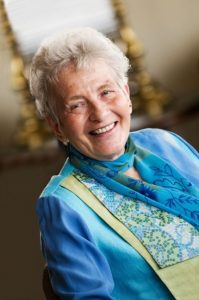
Psychology alumna Carolyn Zahn-Waxler ’62 has spent more than 50 years researching children’s emotional lives, focusing largely on the origins and development of empathy and caring behaviors. Her questions – from how young humans respond to the suffering of others to what inclines us to care for others rather than to harm or avoid them – have laid the foundation for much of what we know now about children’s early social and emotional development. Here, in her own words, Zahn-Waxler shares a brief retrospective of her research and career:
From early childhood I’ve been fascinated by particular aspects of human nature, especially people’s emotional lives and social relationships both in and outside the family, when pain and conflict are present to varying degrees. My own early life experiences created both challenges and opportunities. I’m from Sturgeon Bay, a small town in Door County, Wisconsin. My father had grown up on a nearby farm and was the first to go to college. He was also an alcoholic whose symptoms went largely unnoticed because they paled in comparison to my mother. She became severely depressed during my childhood; she often alternated between immobility and angry outbursts. She also could be fun loving and kind, which made it confusing.
My mother’s suffering shaped my research focus, though I did not realize it at the time. I gravitated toward experimental psychology where, unlike real-life, I could manipulate and control conditions of interest. Psychology professor and mentor Herbert Pick encouraged me to go to graduate school at the University of Minnesota. Without his kind and firm guidance, eventually bringing me the application form, I would not have gone. Job opportunities for female PhD graduates in the late ‘60s were limited. I chose to become a post-doctoral fellow, who then became tenured to conduct research full time at the National Institute of Mental Health with Marian Radke-Yarrow. The only catch with the tenured position was that I would not have my own budget, so independence was an issue.
At NIMH, Marian taught me the value of ecologically valid approaches. I used naturalistic, observational methods jointly with experimental probes, to study social, emotional, and moral development beginning in infancy and early childhood. This was a very new research domain back then when cognitive, behavior, and psychoanalytic theories prevailed. Each theory deemed children younger than 6 or 7 years incapable of moral, caring actions. Our research strongly contradicted this view and identified several genetic and environmental factors that contribute to differences in concern for others. From very recent collaborative work with Maayan Davidov, we now know empathic concern is present in some infants as early as the first few months of life. Darwin, renowned for his work on emotions, observed this sympathetic countenance in his own five-month-old son. Responses of the human young are like those seen in other species when distress is shown, suggesting our strong connections with other animals. This leads to a different view of young children’s potential for morality, generosity, and kindness, as present almost from the onset of life. Babies are able to provide as well as receive comfort. We also identified several child and parent characteristics that contribute to these differences.
Sufficient funding for female professionals was a problem back then. We did not have equal research resources and space as men. We were at the bottom of the totem pole in terms of who we were (women), what we studied (behavior), and the fact that we worked in the Institute of Mental Health rather than Institutes dealing with physical diseases (e.g., Cancer; Heart, Lung, and Blood).
While much has changed, discrimination against female professionals continues. It is important to be vigilant and take nothing for granted. We survived and eventually thrived because we obtained private funding and other scientists were interested in our work. Collaborations with colleagues at other institutions – like Robert Emde, who fostered interdisciplinary research and was instrumental in locating funding venues for my research on early empathy – also provided additional resources and intellectual stimulation. Not being part of an academic institution and with few peers at NIMH, I sought out work in organizations like SRCD and Division 7 of APA to become more involved with people with common interests. I also developed leadership skills in governance as President of Division 7 in the Developmental division of APA, and as Associate Editor, then Editor of the journal Developmental Psychology. These were stimulating times, as challenges shifted to opportunities.
After retirement, my husband and I moved to Madison where I worked as an affiliate in the Psychology Department for a few years, then an Honorary Fellow in different departments at different times to explore more applied questions about how concern for others might be fostered. I’ve been fortunate to be part of what we now know about children’s early social and emotional development compared with 50 years ago. I was lucky to have UW Psychology among the many to thank for the many possibilities that were present.
Dig deeper into Zahn-Waxler’s history and career in this interview with Emotion Researcher.